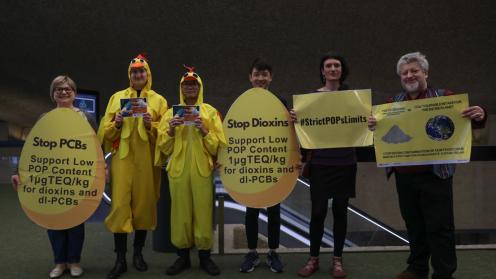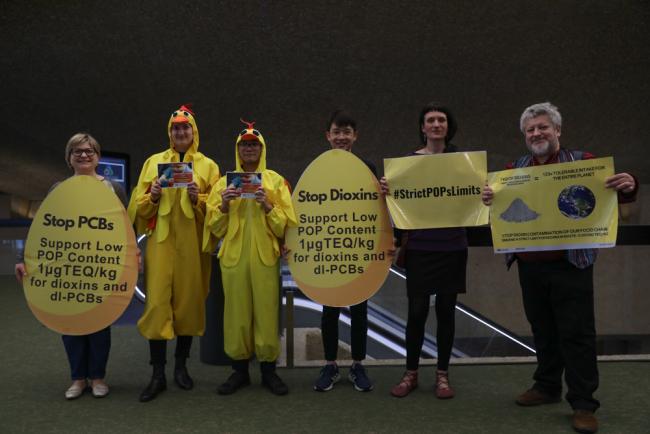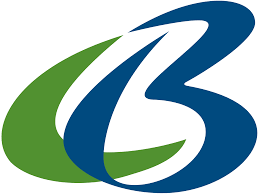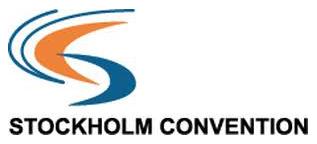About
Delegates will consider whether to eliminate the production and use of several persistent organic pollutants, whether to add prior informed consent trade rules to a number of pesticides, and follow up actions related to e-waste and plastic waste.
From food to cosmetics and paints to textiles, synthetic chemicals are present in every aspect of our lives. Some of the substances we come into daily contact with can be harmful to human health and the environment. Some of these chemicals harm humans and the environment far from their source because they travel in air and water and build up in soil and food chains.
Despite the ubiquitous nature of chemicals and wastes, there is enormous uncertainty. Around 350,000 chemicals are registered for production and use. But for most of these chemicals, there is a lack of legislation and little to no data on their environmental impacts. Experts and regulators alike cannot always tell which chemicals may be in wastes. For example, two plastic products could look alike, but one might contain a hazardous chemical. That plastic needs to be managed with care to avoid re-contaminating the environment. But without labelling or affordable testing, it’s impossible to know.
The Basel, Rotterdam, and Stockholm Conventions (BRS) use different approaches to protect human health and the environment, but they share an emphasis on scientific expertise. Each Convention’s decisions are informed by their scientific subsidiary bodies. Each also continues technical work, including on the environmentally sound management of wastes.
The Stockholm Convention eliminates or reduces the production and use of a group of chemicals called persistent organic pollutants (POPs). They are toxic chemicals that persist and travel in the environment, bioaccumulate, and pose risks to human health and the environment, potentially causing cancer, reproductive problems, and developmental disorders.
Based on the recommendations of its scientific body, the POPs Review Committee, parties to the twelfth meeting of the Conference of the Parties (COP) to the Stockholm Convention will consider whether to eliminate the production and use of three POPs (with some exemptions for short-term specific uses):
- Chlorpyrifos, used as a pesticide;
- Chlorinated paraffins with carbon chain lengths in the range C14–17 and chlorination levels at or exceeding 45%, a group of chemicals used as plasticizers, additives in metalworking fluids, and in paints, sealants, adhesives, and other polymeric materials; and
- Long-chain perfluorocarboxylic acids, their salts and related compounds, used in firefighting foams, textiles, cosmetics, and food packaging materials because they repel water, oil, dirt, and grease.
For the first time, there is a proposal to revisit and potentially amend a previous decision. Ethiopia has sought to add exemptions for the use of UV-328 in adhesives, potting compounds, and other specific applications within the aviation sector, arguing that viable alternatives are currently unavailable. Countries previously agreed to eliminate the production and use of UV-328 with some exemptions. This year, parties will have to debate if there is reason to allow this POP to be produced and used in the aviation sector for these uses.
The Rotterdam and Basel Conventions address trade in hazardous chemicals and wastes, respectively. Both require the prior informed consent (PIC) of the importer before trade can take place. For example, all electrical and electronic waste (e-waste) became subject to the Basel Convention’s PIC procedure on 1 January 2025. The seventeenth meeting of the COP to the Basel Convention will consider how to improve its PIC procedure and follow up actions related to e-waste and plastic waste.
The Rotterdam Convention has struggled to list the chemicals recommended by its technical subsidiary body, the Chemical Review Committee. As a result, six chemicals have remained on the agenda, almost all pesticides. These chemicals are not subject to the Convention’s PIC procedure (the Rotterdam Convention does not ban chemicals). Parties to the twelfth meeting of the COP to the Rotterdam Convention will also consider new recommendations to add the pesticides paraquat and methyl bromide, and also mercury to the Convention’s PIC procedure.
For the first time in several years, there will be a high-level segment for ministers to renew their commitment to the BRS Conventions. Under the theme “Make Visible the Invisible: Sound management of chemicals and wastes,” the high-level segment may prove a useful opportunity for ministers to share experiences and learn more about the need to advance safe chemicals and wastes management.
The BRS Conferences of the Parties will take place from 28 April to 9 May 2025 in Geneva, Switzerland.
The Earth Negotiations Bulletin (ENB) writers for this meeting are Jennifer Allan, Ph.D.; Anna Dubrova; María Gutiérrez, Ph.D.; and Noémie Laurens, Ph.D. The Digital Editor is Mike Muzurakis. The Editor is Pam Chasek, Ph.D.
View past and future events
Past event
5th Meeting of the Conference of the Parties (COP5) to the Basel Convention
Past event
6th Meeting of the Conference of the Parties (COP6) to the Basel Convention
Past event
7th Meeting of the Conference of the Parties (COP7) to the Basel Convention
Past event
5th Session of the Open-ended Working Group of the Basel Convention (OEWG5)
Past event
8th Meeting of the Conference of the Parties (COP8) to the Basel Convention
Past event
9th Meeting of the Conference of the Parties (COP9) to the Basel Convention
Past event
10th Meeting of the Conference of the Parties (COP10) to the Basel Convention
Past event
2013 Meetings of Basel Convention COP11, Rotterdam Convention COP6, Stockholm Convention COP6, and ExCOPs2
Past event
9th Meeting of the Open-ended Working Group of the Basel Convention (OEWG9)
Past event
2015 Meetings of the Conferences of the Parties to the Basel, Rotterdam and Stockholm Conventions (BRS COPs)
Past event
10th Meeting of the Open-ended Working Group of the Basel Convention (OEWG10)
Past event
2017 Meetings of the Conferences of the Parties to the Basel, Rotterdam and Stockholm Conventions (BRS COPs)
Past event
11th Meeting of the Open-Ended Working Group of the Basel Convention on the Control of Transboundary Movements of Hazardous Wastes and their Disposal (OEWG11)
Past event
2019 Meetings of the Conferences of the Parties to the Basel, Rotterdam and Stockholm Conventions
Past event
12th Meeting of the Open-ended Working Group of the Basel Convention on the Control of Transboundary Movements of Hazardous Wastes and Their Disposal (OEWG12)
Past event
2021 Meetings of the Conferences of the Parties to the Basel, Rotterdam and Stockholm Conventions (BRS COPs)
Past event
Resumed Session of the 12th Meeting of the Open-ended Working Group of the Basel Convention (OEWG-12)
Past event
Face-to-Face Meetings of the Conferences of the Parties to the Basel, Rotterdam and Stockholm Conventions (BRS COPs)
Past event
13th Meeting of the Open-ended Working Group of the Basel Convention
Past event
2023 Conferences of the Parties to the Basel, Rotterdam, and Stockholm Conventions (BRS COPs)
Past event
14th Meeting of the Open-ended Working Group of the Basel Convention
Past event
2025 Conferences of the Parties to the Basel, Rotterdam, and Stockholm Conventions (BRS COPs)
To receive free coverage of global environmental events delivered to your inbox, subscribe to the ENB Update newsletter.




